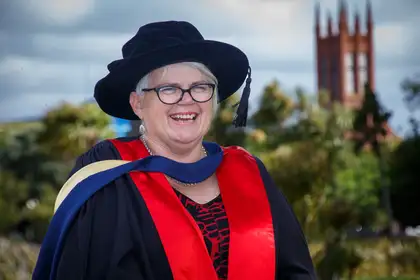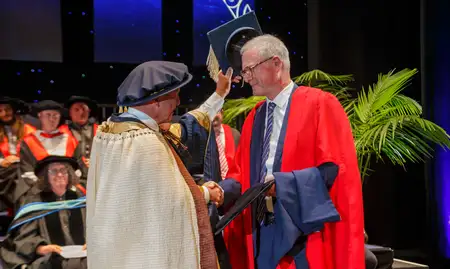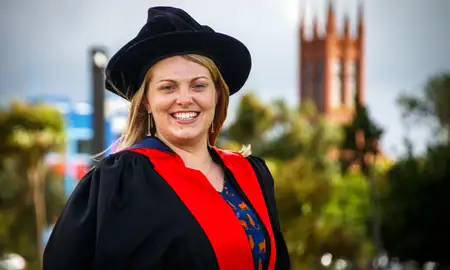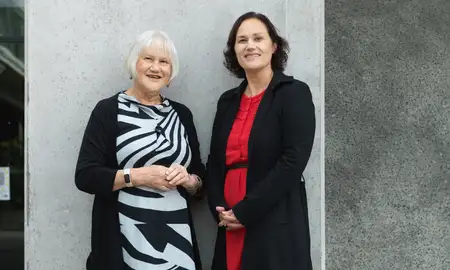
Dr Julie Whyte
Hawke’s Bay grandmother Julie Whyte graduated with her Doctor of Education in Palmerston North recently after completing her doctoral research on the topic of maths anxiety in New Zealand primary school teachers.
A teacher herself, Dr Whyte’s interest in maths anxiety began when she was working in a primary school while completing her Master of Education.
“I noticed that two male learners were hesitant in becoming involved in maths learning, so maths anxiety became my focus for my master’s,” Dr Whyte explains.
She soon discovered that there was limited research about teachers who suffered from maths anxiety.
“I wanted to learn what primary teachers' histories were of maths anxiety, as well as how maths anxiety impacted their professional role and influenced their maths teaching.”
The 55-year-old’s doctoral research examined the personal histories and professional lives of 12 primary teachers who self-reported as maths anxious, though it was found that these teachers also developed maths teaching anxiety. Her research defined maths teaching anxiety as the anticipation of or involvement with activity relating to maths teaching, or to the beliefs held in relation to perceived competence with teaching maths.
“I found that responses to maths anxiety were wide-ranging and included thought, physical, emotional and neural reactions.”
The teachers Dr Whyte interviewed used a range of different strategies to deal with their anxiety, including avoiding teaching maths, only teaching lower year-level classes, doing lengthy preparation for teaching, and getting support from one or two people they trusted.
There were several things that surprised Dr Whyte about her research findings, including the length of time that these teachers put into preparing for teaching.
“Many would spend hours checking their understanding of the maths concepts to be taught, researching those concepts, watching videos, practicing solving related problems and finding resources for teaching.”
Many participants also found that they experienced heightened maths anxiety during professional development which meant they had difficulty developing their maths teaching practice as they became focussed on the anxiety. Some participants undertook their own self-directed professional learning to improve both their maths understanding and maths teaching practice.
Dr Whyte has recently shared her research with the Ministry of Education. She hopes it will help develop a greater awareness and understanding of the anxiety that some primary teachers experience around maths and its teaching.
“A greater awareness of maths anxiety must be developed for teachers, including those working in Initial Teacher Education (ITE), before maths anxiety has to be unlearned,” she says.
“A greater awareness will not only provide teachers with an understanding of maths anxiety, but also the teaching practices that are likely to promote it. With this understanding and knowledge, teachers will be in a more positive position to recognise anxiety in themselves and that experienced by colleagues, pre-service teachers and students; assist in reducing anxiety for mathematics; and remove, or at least reduce, those instructional practices that enable maths anxiety to flourish in classrooms.”
Dr Whyte, who works as a Teacher Educator/Lecturer at Eastern Institute of Technology, Te Pukenga in Napier, has completed her entire tertiary study extramurally at Massey, beginning with a Bachelor of Teaching (Primary) in 2004.
Even though her doctorate is now completed, she is not stepping back from study and has been completing a postgraduate paper with Massey that is focused on developing mathematical inquiry communities.
“I was a slow starter to tertiary study, beginning when I was 35 years young, and some may think that's too old. However, I've found great delight and satisfaction in achieving the academic goals that I've set for myself - you're never too old to start learning, or perhaps to stop!”
More news
Former Vice-Chancellor receives Honorary Doctorate
Former Massey University Vice-Chancellor, the Honourable Steve Maharey CNZM, has been awarded an Honorary Doctorate of Literature at a graduation ceremony in Palmerston North today.

Upholding the mana of te reo: Graduate completes entire degree in Māori
For most people, completing their first degree is hard enough as it is, but Suraya Goss, Te Ātihaunui-a-Pāpārangi, took on the added challenge of completing her entire qualification in te reo Māori.

Understanding the veterinarian’s role in end-of-life management
Longer life expectancies in domestic cats mean many are living with chronic conditions. For owners, caring for their ageing cats involves not only managing these conditions, but having to make the hard decision of when to say goodbye.

Helping school children overcome mathematics anxiety
Helping students to better connect with their maths lessons is at the heart of work currently being undertaken at the Massey Centre for Research in Mathematics Education.
